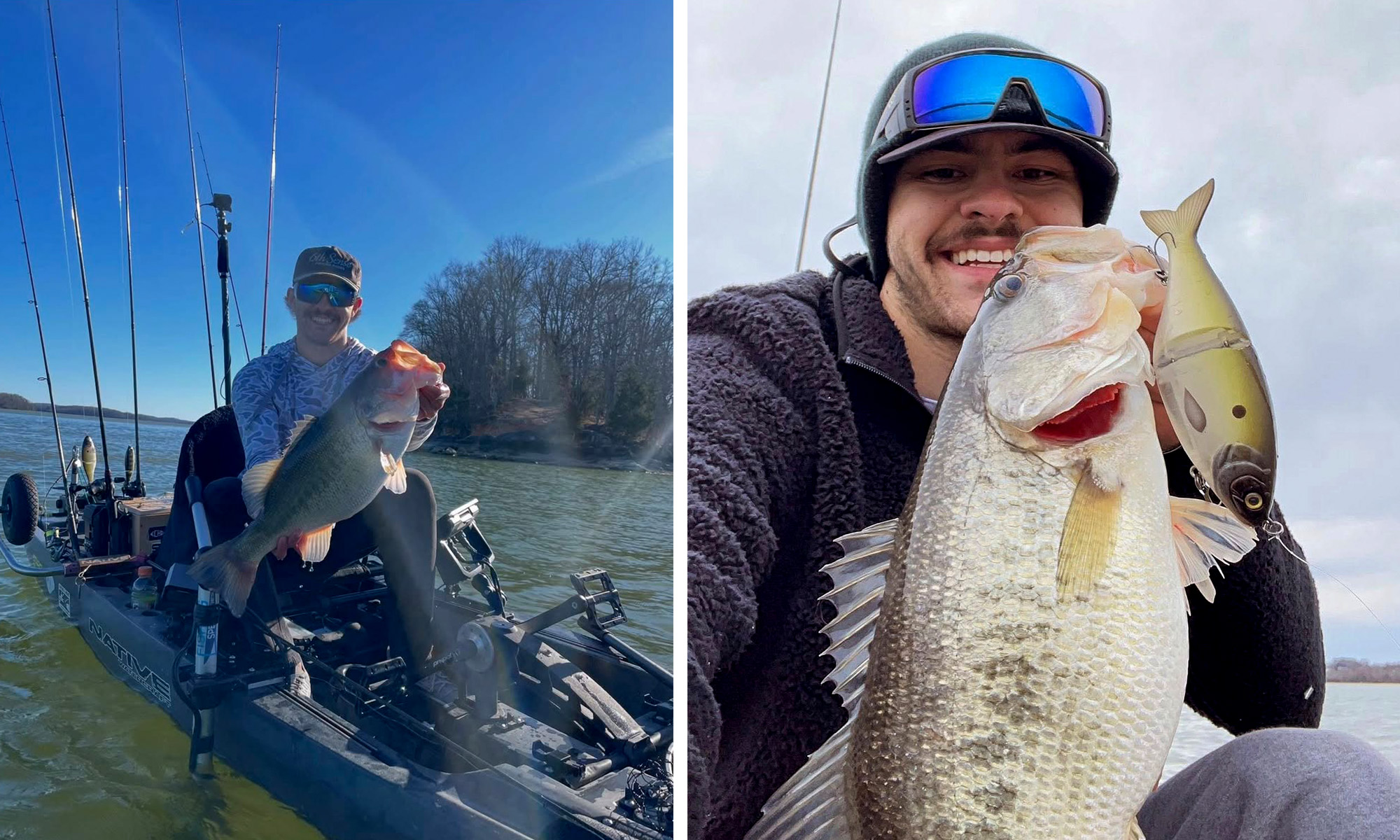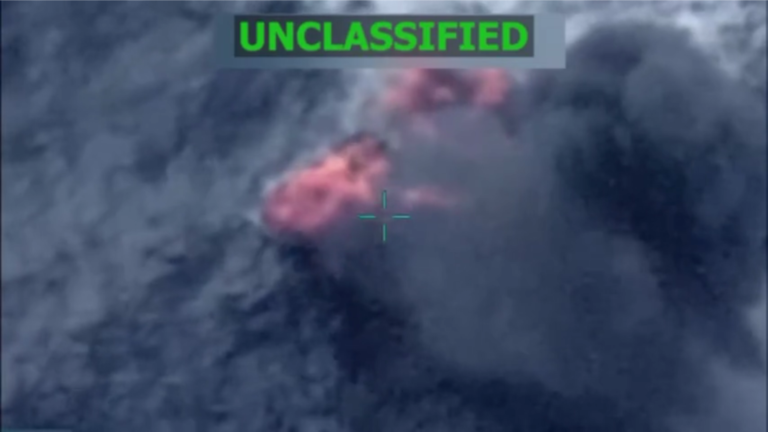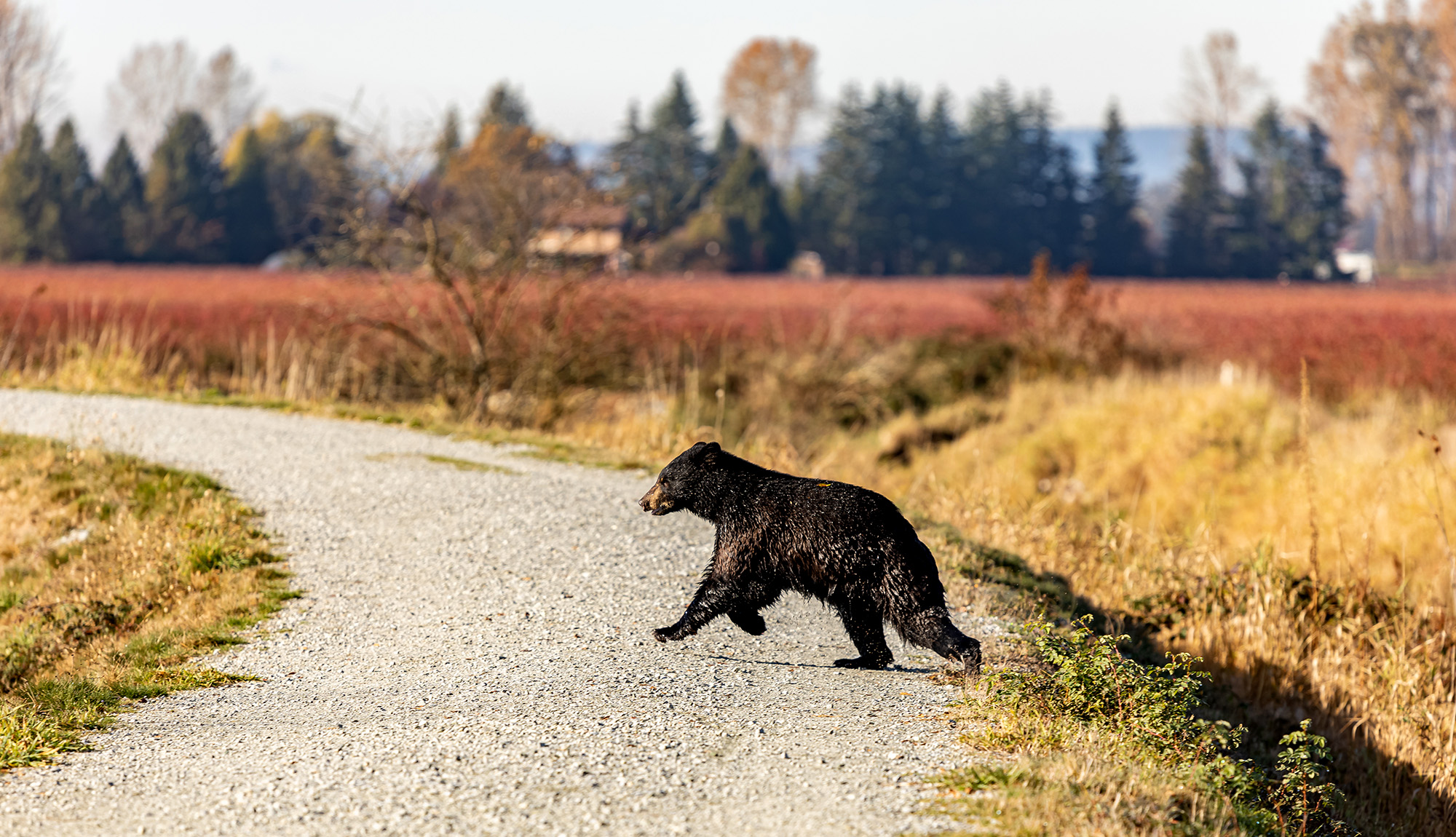Catching and Preserving Fish in Survival Situations – Survivopedia

The first thing that slaps you in the face when the grid goes dark and the last granola bar’s gone? Hunger. Not that kind of “I skipped breakfast” hunger either, I’m talking about the real, throat-hollowing, slow-burning need.
I’ve said it before and I will say it again: “Food will remain one of your biggest concerns during a survival scenario!”. Don’t get me wrong, I’m not saying that water should be neglected. I’m just pointing out that we are a nation that loves eating regular meals, snacking and everything that involves food.
When you find yourself during a survival situation, in those moments, fish, those cold, slippery, gilled miracles, start to look like the difference between keeping your edge or slipping into madness and foggy thinking.
In a true bug-out survival scenario, far out in the backwoods of North America, fish become more than food. They’re mobile protein factories hiding in plain sight. Fish are the fast, quiet, and clean-burning fuel that your body craves when your stomach starts growling. And the best part is that unlike deer, squirrels, or other game out there, fish don’t bolt at the crackle of a dry leaf or your scent drifting on the wind. They just swim until you figure out a way to stop them from doing that.
However, there’s a little problem you need to deal with: fish won’t jump into your pan just because you need or want them. They don’t care that your boots are falling apart, or that you haven’t eaten in two or three days. Fish don’t give a damn about your fingers shaking when you try to tie a knot. You want to live and see the next sunrise? You’ve got to turn into a predator and think like one.
Finding water that holds fish
Not all water is created equal and if you stumble upon a big puddle, you can’t (and shouldn’t expect) a trout to hop out. The right water, the kind that actually holds fish, has its own voice, and learning to listen to it is something you should be picking up fast when your stomach starts making more noise than the creek itself.
Still water can hold fish and so can raging rivers that twist through heavy timber. However, the moving water, especially where it narrows or deepens suddenly, that’s your main target. Look for shadows under cut banks, riffles where oxygen rushes in, or downed logs that break current and create little pockets of calm. Those are the spots where fish stack up, resting and waiting.
You should always watch the surface because bugs skittering in the morning light usually mean hungry fish are lurking below. Birds are your friends and herons and kingfishers don’t hang around empty water holes. Frogs, dragonflies, or even a strong earthy smell near the shore often mean the ecosystem’s alive and ticking. That’s your green light to cast your fishing line.
Even when the water’s too murky to see into, or the current too strong to spot signs, you shouldn’t despair and you should start testing your luck. Take your time to sit and listen, and even throw the bait rig you managed to improvise. Waiting and patience are your weapons, but don’t put all your trust in them. If nothing moves after an hour or two, you should move on because you’re just burning daylight and calories. You’re running short on both so don’t wait for miracles.
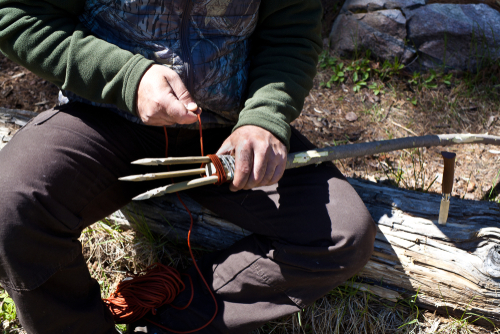
Improvise fishing tools or use your hands
Most folks aren’t carrying a full tackle box when the brown stuff hits the fan. Even those that like to go camping every now and then, don’t always bring along their fishing gear. If that’s the case, perhaps you’ve got a multi-tool, a little paracord, or the shoelaces from your boots. You should be able to improvise something because survival fishing isn’t about flashy gear, it’s about knowing how to turn trash into treasure.
You can carve your hooks from bones or pieces of wood, safety pins, and even soda can tabs with a little bit of work. Pretty much everything you can scavenge should be put to the test and made into fishing gear. Braided inner threads from paracord work beautifully, but in a pinch, plant fibers, sinew, or even dental floss can get the job done. You lack sinkers? How about you try smooth stones tied in cloth or wedged into split sticks. How about floats? Try your luck by whittling a chunk of bark, or use a feathered twig.
I should warn you that all of this is messy work, and you will cut your fingers and lose your patience. You will most certainly curse when the knot slips or the hook snaps, but eventually, you will get there. With enough spit and stubbornness, you’ll put together something that catches more than just river weed or trash.
And if you don’t have the skills to turn trash into fishing gear, there are still traps that you can improvise and use. The ones you’ve seen in most survival literature, the glorious, passive tools that work while you sleep, gather firewood or take care of other survival needs. For example, a V-shaped rock funnel in shallow water can funnel small fish right into a woven basket or net. How about a snag line draped across a stream with multiple hooks on short droppers? That’s an old-timer’s secret, and it still works just as well now.
No, it’s not sophisticated or fancy, but yet again, nothing about survival is.
Your skills and tactics versus the fish
There’s something you start to realize after the third day with no fire and the first signs of a headache from low blood sugar. Catching fish isn’t about dumb luck, and it’s about rhythms and patterns you keep on putting to the test. You should be learning to stop thrashing around like a rookie and watch how the wild breathes.
Early morning and late dusk are golden hours for fishermen since the fish feed more aggressively because insects are most active. For example, on overcast days you’re in luck because that feeding window stretches longer. If you’re standing there under the noon sun, line in hand, wondering why nothing’s biting, well… maybe you need to think like a fish. Would you bite a shiny thing if a hawk’s shadow just passed over?
Sometimes, I believe it’s better to fish slowly and still, almost meditative. Let the line sit, and just twitch it now and then to create motion. Sometimes, you need to be more aggressive and jig the line, drag bait along the bottom, stir up sediment like a wounded minnow might. Sure, it depends on the type of fish you are trying to catch, your skills and experience, but in the end, trial and error will teach you faster than any book.
And remember that in most situations (regardless of whether it’s a survival or leisure activity) your biggest enemy isn’t the fish but your own impatience. If you burn too many calories pacing the bank or thrashing the water, you’re on losing ground even if you do catch something.
You didn’t manage to catch anything? How about those traps?
This is where the smart survivor starts getting efficient. Active fishing burns time and when you find yourself in a survival situation, time always works against you. But if you set a trap, that thing will work for you 24/7 and it won’t require your constant attention.
Basket traps made from flexible saplings or vines can be shaped into one-way entry cones. Place them in shallow areas where fish travel, weigh them down with stones, and leave them be overnight. When the morning comes, you might have some fish waiting for you and perhaps your meals for the day are taken care of.
Rock corrals, old-school, brutal simplicity. Stack stones to form a crescent in shallow water with a small gap at one end. Drive fish into it, then block the entrance. Not graceful, but effective when water levels are low and you’re desperate.
But how about those rare cases when you’ve got nothing but your own hands? Then, that’s the time when you start playing with sand and mud, and everything you can get your hands on. Build up channels, thorny brush fences, and even scooping with a hollowed log or bark plate can get you something small to eat. Yes, I know that one or two minnows might not seem like much, but if you have enough of these little swimmers and you dry and smoke them. That’s your winter protein right there.
Bait matters too. Worms, grubs, crushed berries, and even chewing gum. Anything with scent will do the trick. You get creative fast when it’s your stomach making the decisions.
Killing and cleaning the fish
You don’t need to be squeamish out there when the time runs against you, but you also don’t need to be cruel. A fish that’s flopping around in panic isn’t just suffering, it’s wasting energy and lowering meat quality. Blunt trauma to the head is the quickest and cleanest method and it always does the trick.
Now slit the gills and let it bleed into the stream. You’ll notice the flesh looks better when it’s cleaned out properly. How about the gutting process? It’s simple enough for anyone, and a sharp stick or knife can be used to slice from the vent to the gills, and remove everything inside. Rinse with clean water if you’ve got it, or snow, if it’s winter. Done right, you can have a fish cleaned in under a minute.
Save the guts and use them for bait later on. Even more, if you are good at starting a fire in any environment and keep it going, you can boil the guts into something resembling soup. Yes, it’s gross and you will have a hard time swallowing it if you’re a picky eater. But survival doesn’t wait for your palate to evolve.
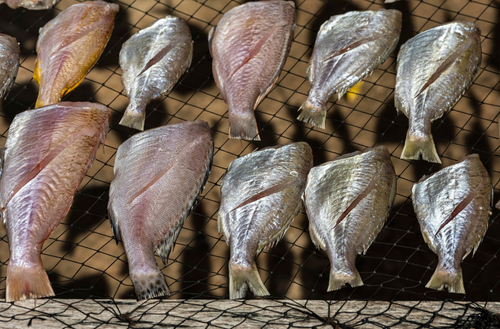
Preserving fish when you lack modern appliances
This is the part no one talks about enough in survival literature. Lady Luck smiles upon you and you manage to catch ten fish in one day. Yeah, it’s an amazing accomplishment but what will you do with all the fish if you’re not able to keep it edible. If you can’t preserve it, you’ve just wasted energy catching a banquet that rots by dawn.
This is where the classic method of smoking fish comes to your rescue. Dig a small trench, build a low fire, and lay green sticks across the top. Split the fish, open it like a book, and lay it skin-side down. Cover with damp leaves or a lean-to of branches to trap smoke. Slow smoke for hours and sometimes even all day. The smell alone will drive you half-crazy with hunger.
But drying works too if the sun’s out and the bugs aren’t going crazy. You can slice fish into strips and hang them on a cord or sticks above the fire. You can protect them with a thin piece of cloth, and it’s even better if there’s wind, since it helps keep the flies off. A light salting helps, if you somehow have salt stashed. But even without it, enough heat and air can dry fish into something leathery but edible.
When your survival depends on what you catch and preserve, you’ll learn pretty quickly to wrap finished strips in bark or stash them in tight knots of cloth. Keep in mind that pests love smoked fish almost as much as you do.
During the winter and the cold months, you’re in luck. Freeze what you can’t eat and bury it in snow or ice. Nature’s freezer doesn’t care about your energy bill or monthly budget.
Fish is more than food—it’s a lifeline
When you’ve been cold for three nights straight, and your hands are cracked from wind and sap, a piece of smoked fish isn’t just nutrition, it’s fire in your blood. That meal you managed to preserve for harsh times provides what we all need when our survival is at stake: comfort. A familiar feeling that reminds you of campfires before the collapse. Of the moments when the world made a little more sense.
Don’t underestimate the morale boost any food brings during a survival situation. Even more, having food stashed, ready, and safe helps you calm the nerves and make the right moves. It gives you space to plan, rest, and think, making the difference between panic and patience.
As an avid outdoor explorer, trust me when I say that out here, you’re not just feeding your body, you’re feeding your soul and your will to keep going.
Seasonal fishing and its limitations
The way you fish in spring won’t save you in January. Ice changes everything, and as you should have learned by now, survival is all about adapting to the environment and seasonal changes.
Can you try ice fishing with no auger? You sure can if you look for cracks, natural openings, and spots where creeks flow into frozen lakes. Figure a way to smash through, using a rock or a large piece of wood and drop bait on a line. Keep your eyes on it and weight it down with something so you don’t lose the whole rig.
Come summer and spoilage becomes your number one enemy. Fish spoils fast and either you eat it quickly or start to dry it before the flies and pests find it. If you have to move your campsite, you can dry the fish on the go with portable racks or even split walking sticks. However, keep the fish off your back to avoid scent trails because you might end up dining with a bear once it tracks you, just like it tracked the fish.
And if you’re lucky enough to settle somewhere for a stretch, rotate. Don’t fish the same pool every day and just let the water breathe. Let the fish come back so you can feast again.
Final Thoughts
You’ll be surprised what silence teaches you when you’re crouched by the stream, line in hand, cold mud in your boots. Fishing in survival scenarios isn’t about sport or peace, but rather about understanding what it means to earn every bite you catch. You will begin to notice life hiding just below the surface, and you will begin to grow your patience, waiting for a mistake.
Some days you catch nothing; while others it feels like the water gives you a gift. Either way, you keep coming back because catching fish in a survival situation helps you not only stay alive, but also keep your humanity. Most of you will remember that patience, persistence, and a little luck still have a place, even when everything around you seems to be falling apart.
So yeah, fish may not care about your daily job or extensive resume when survival is at stake. However, if you care enough to spend the time and learn their ways before you’re thrown unexpectedly into the wilderness, you just might live to make it back home and tell your tale.
Read the full article here




